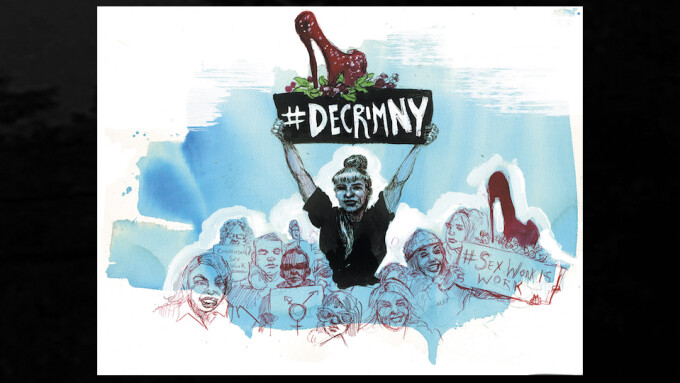NEW YORK — A new article in prominent art criticism and news magazine ARTnews explores the increasingly visible connections between the art world, sex work and sex worker advocacy.
Titled “Divisions Between Art and Sex Work Grow Blurrier During Coronavirus Pandemic,” the ARTnews piece, written by Ana Finel Honigman, described the installation space Sex Workers’ Pop-Up, which had to shut down in March, two days after it opened, when the social distancing protocols went into effect in New York.
The artwork, she wrote, “spoke to the experiences of fierce fighters in a field that has been subject to ongoing stigma and criticism. ‘When your very existence is criminalized, survival becomes a radical action,’ read text included as part of an installation of black-and-white portraits of black and brown, cis and trans women by photographer Kisha Bari."
The exhibition included "Molly Crabapple’s drawings of Decrim NYC for the defunct sex-worker magazine $pread, video interviews with South African sex workers by Candice Breitz, performance photos by Annie Sprinkle, and a canopy of red umbrellas—the international symbol of the sex workers’ rights movement—by Sun Kim.”
“Such a moment of celebration and call for action by the sex workers’ rights movement,” Honigman continued, “was cut short by the coronavirus, which has created a new existential threat to those who cannot afford to stop working during the crisis and have no access to resources available for other service-industry professionals."
"Sex workers who also have careers in the art world, whether as artists or muses to creators, have remained resilient, continuing to produce important work during a time of crisis," she added.
Honigman also interviewed artists who do sex work, artists interested in the interplay of both areas and allies in sex worker advocacy. These included semi-retired adult performer Stoya and cam model/performance Artist Ona.
“The majority of sex workers live precarious lives, even at the best of times,” artist Candice Breitz said. “For many of us, this virus—which has forced us to radically reconsider how we engage with the world—has created various levels of inconvenience, loss of income, loss of stability. But of course those who are affected the most severely and most brutally by the pandemic are those who must weather this crisis without the set of social and legal protections that are afforded to many of us as ‘human rights.’”
To read “Divisions Between Art and Sex Work Grow Blurrier During Coronavirus Pandemic,” visit ARTnews.
Image: Protesters at a rally for the decriminalization of sex work, New York City, February 2019. Drawing by Molly Crabapple (courtesy of the artist).







